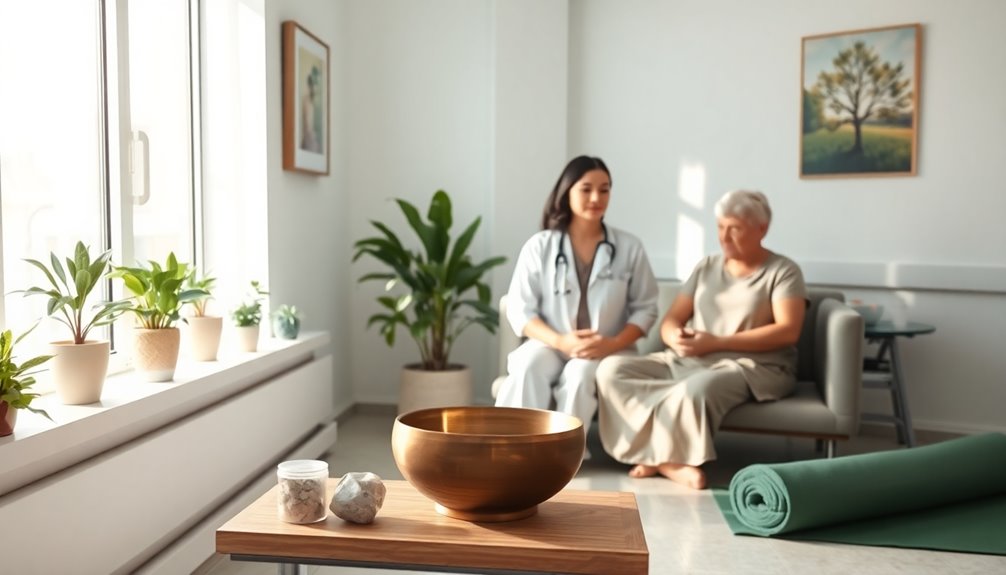Holistic health practitioners work in various settings such as private practices, wellness centers, and integrative health clinics. They also operate within community health organizations, hospitals, educational institutions, and corporate wellness programs. You might find them providing personalized care in home health care environments or through virtual health platforms for added convenience. Each location focuses on promoting overall well-being and integrating alternative therapies. Curious about the diverse approaches they use across these settings?
Key Takeaways
- Holistic health practitioners work in private practices and home health care settings, providing personalized care and customized treatment plans.
- Wellness centers and integrative health clinics offer a variety of holistic services, including nutrition counseling and acupuncture, in a client-centered environment.
- Community health organizations and rehabilitation facilities focus on tailored wellness programs that integrate alternative therapies with traditional methods for comprehensive recovery.
- Hospitals increasingly incorporate holistic health practices, with practitioners collaborating in multidisciplinary teams to enhance patient care and satisfaction.
- Educational institutions and corporate wellness programs employ holistic health practitioners for workshops and personalized health assessments to improve overall well-being.
Private Practices

When you visit a holistic health practitioner in a private practice, you're likely to experience personalized care that's tailored specifically to your needs.
These practitioners often focus on specialties like nutrition counseling, acupuncture, and herbal medicine, creating customized treatment plans that resonate with you.
The serene environments of private practices promote relaxation, enhancing your overall client experience.
Whether you're working with a solo practitioner or a small team, the attention to detail and commitment to your well-being is evident.
Many holistic health practitioners use effective marketing strategies to attract clients, emphasizing their unique approaches and modalities.
In a private practice, you'll find a supportive atmosphere that fosters healing and personal growth, making it an ideal setting for your wellness journey.
Wellness Centers

Wellness centers offer a variety of holistic services tailored to your needs, from nutrition counseling to yoga classes.
You'll find a client-centered environment where holistic health practitioners work alongside other experts to create personalized health plans.
This collaborative approach not only addresses your symptoms but focuses on your overall well-being. Additionally, effective relaxation techniques are often incorporated into wellness programs to help manage stress and promote mental clarity.
Holistic Services Offered
Holistic health practitioners at wellness centers offer a diverse range of services designed to enhance your overall well-being. These integrative services cater to various client needs, ensuring a personalized approach to health. You can benefit from treatments like acupuncture, massage therapy, and nutritional counseling, all aimed at supporting your holistic health journey. Additionally, many wellness centers incorporate adaptogenic properties to help reduce stress and promote relaxation.
| Service | Description | Benefits |
|---|---|---|
| Acupuncture | Stimulates energy flow | Pain relief, balance |
| Massage Therapy | Relieves tension and stress | Relaxation, improved circulation |
| Nutritional Counseling | Guides healthy eating habits | Weight management, liveliness |
Wellness centers often emphasize preventative health, offering workshops and engaging in collaborative care to empower you in achieving lasting wellness.
Client-Centered Environment
In a client-centered environment, you'll find that practitioners prioritize your unique needs and preferences.
Wellness centers are designed to provide holistic health services that focus on client-centered care. Here, holistic health practitioners collaborate across disciplines, creating thorough care plans tailored to you. They employ integrative approaches that address your physical, emotional, and spiritual well-being through personalized treatment options.
You can also participate in educational workshops that empower you with knowledge about holistic health practices and self-care strategies. Many of these workshops incorporate essential oils for aromatherapy, which can enhance relaxation and overall wellness.
As demand for alternative healthcare continues to rise, wellness centers are expanding, offering an increasing variety of services. This supportive environment guarantees you receive the attention and care necessary to enhance your overall health and well-being.
Integrative Health Clinics

As you explore the evolving landscape of healthcare, you'll find integrative health clinics at the forefront, merging conventional and alternative medicine for a more extensive approach to patient care.
These clinics employ holistic health practitioners who work alongside conventional medical professionals to address both physical and emotional health needs.
By focusing on preventive care, integrative health clinics promote long-term wellness and reduce reliance on prescription medications through natural therapies.
Here, you'll experience collaborative care that results in personalized treatment plans tailored to your unique needs.
The growing interest in holistic health approaches drives the rise of these clinics across the United States and worldwide, ensuring you receive a thorough approach to your health and well-being.
Community Health Organizations

In community health organizations, you'll find holistic health practitioners working on collaborative health initiatives that prioritize preventive care programs.
These settings often host community wellness workshops, helping you learn practical strategies for maintaining your health.
Collaborative Health Initiatives
Collaborative health initiatives play an essential role in enhancing community wellness by integrating diverse health services.
In these settings, holistic health practitioners team up with conventional medical professionals, delivering thorough care that addresses the unique needs of individuals.
You can expect to find:
- Engaging workshops that educate you on holistic practices.
- Tailored wellness programs focusing on nutrition and lifestyle changes.
- Preventive care strategies aimed at underserved populations.
- Team-based care models that emphasize collaboration for better health outcomes.
Preventive Care Programs
Preventive care programs, designed in partnership with community health organizations, aim to enhance overall wellness by addressing the specific needs of diverse populations.
Holistic health practitioners play an essential role in these initiatives, facilitating workshops, health screenings, and educational seminars focused on nutritional counseling and stress management.
By integrating alternative therapies such as yoga and meditation, these programs promote accessible wellness resources tailored to community needs. They specifically target health disparities, ensuring that all individuals have opportunities for improved health outcomes.
In addition, evidence indicates that incorporating holistic practices fosters greater community engagement in personal health management, empowering individuals to take charge of their wellbeing.
Ultimately, these preventive care programs contribute to a healthier, more vibrant community.
Community Wellness Workshops
Community wellness workshops serve as essential platforms where holistic health practitioners share knowledge and engage with participants on various health topics.
These workshops, often held by community health organizations, focus on holistic approaches to well-being and preventive health practices.
They cover valuable subjects like:
- Nutrition: Learn to nourish your body.
- Stress Management: Discover techniques to find balance.
- Alternative Therapies: Explore diverse healing options.
- Practical Skills: Gain tools to enhance your health journey.
Additionally, participants may benefit from insights on essential oils which can promote emotional and physical wellbeing.
Hospitals

As hospitals increasingly recognize the importance of holistic health, many are integrating these practices into their treatment protocols.
Holistic health practitioners often work alongside conventional medical teams to provide integrative care, addressing both physical and emotional health needs. You might find them offering services like nutrition counseling and stress management techniques, as well as complementary therapies such as acupuncture to enhance patient recovery.
This collaborative care approach involves multidisciplinary teams creating thorough treatment plans for patients. In addition, some hospitals have dedicated wellness centers or integrative health programs where holistic practitioners provide alternative therapies alongside traditional medical treatments. Furthermore, the integration of pet therapy has shown to enhance emotional well-being for patients with conditions such as dementia and Parkinson's, illustrating the value of holistic approaches in diverse healthcare settings.
This trend reflects a growing commitment to improving patient satisfaction and outcomes through a more rounded approach to healthcare.
Rehabilitation Facilities

In rehabilitation facilities, you can experience holistic recovery programs that blend alternative therapies with traditional methods. These integrative therapy approaches not only focus on your physical healing but also support your emotional well-being. Incorporating low-impact exercises can further enhance the recovery process and promote overall health.
Holistic Recovery Programs
Holistic recovery programs in rehabilitation facilities offer a thorough approach to healing that addresses not just the symptoms of substance use disorders and mental health issues, but the whole person.
These integrated approaches focus on physical, emotional, and spiritual well-being, helping you find a balanced path to recovery.
Here are four key aspects to evaluate:
- Mindfulness practices that promote mental clarity
- Group therapy sessions that foster community support
- Alternative therapies like yoga and acupuncture for overall healing
- Nutrition counseling to nourish your body and mind
Integrative Therapy Approaches
While traditional rehabilitation methods focus primarily on physical healing, integrative therapy approaches in rehabilitation facilities take a more holistic view of recovery. Holistic health practitioners work alongside medical professionals, creating extensive treatment plans that address both physical recovery and emotional well-being. They implement therapies like acupuncture, massage therapy, and nutritional counseling, helping you recover from injuries or substance abuse. These approaches can also incorporate tools like indexed annuities to provide financial security during your recovery journey.
Here's a quick overview of integrative therapy approaches:
| Therapy Type | Focus Area | Benefits |
|---|---|---|
| Acupuncture | Pain Relief | Reduces discomfort |
| Massage Therapy | Muscle Recovery | Enhances mobility |
| Nutritional Counseling | Dietary Support | Improves overall health |
| Emotional Support | Mental Health | Boosts emotional well-being |
| Personalized Strategies | Individualized Care | Tailors recovery plans |
These strategies promote your overall quality of life during recovery.
Educational Institutions

As educational institutions increasingly recognize the importance of holistic health, practitioners often find themselves playing a vital role in enhancing student wellness.
You might encounter holistic health practitioners in various capacities, including:
- Leading workshops and seminars on holistic practices
- Collaborating with colleges on alternative medicine and nutrition courses
- Serving as guest lecturers, sharing their expertise in holistic methodologies
- Developing and implementing wellness programs that support student health
These practitioners not only contribute to the well-being of students but also engage in research initiatives that explore holistic treatments' effectiveness.
Corporate Wellness Programs

Incorporating holistic health practices into corporate wellness programs is increasingly popular among organizations aiming to boost employee well-being and productivity. Holistic health practitioners provide personalized health assessments, nutrition counseling, and stress management workshops that foster a healthier workplace culture. By integrating mindfulness training and group fitness classes tailored to employees' needs, companies can markedly reduce absenteeism rates and improve morale. Additionally, focusing on energy protection in chaos can help employees maintain their well-being amidst workplace stressors.
| Service Offered | Benefits | Impact on ROI |
|---|---|---|
| Nutrition Counseling | Enhances dietary habits | $3-$6 return |
| Stress Management Workshops | Reduces stress levels | Lower healthcare costs |
| Mindfulness Training | Improves focus and mental health | Increased engagement |
| Group Fitness Classes | Boosts physical health | Enhanced productivity |
| Personalized Health Assessments | Tailors wellness strategies | Better employee retention |
Home Health Care

Holistic health care at home offers a personalized approach that meets individual needs, enhancing your overall well-being in a familiar environment.
Holistic health practitioners provide extensive care plans that address your physical, emotional, and social health challenges. Here are some benefits you can experience:
- Tailored nutrition counseling that fits your lifestyle.
- Effective stress management techniques to promote relaxation.
- Therapeutic exercises designed for your mobility and comfort.
- Energy healing modalities that elevate your spirit.
This setting is especially beneficial for elderly patients or those with mobility issues, fostering close, trusting relationships that encourage adherence to health plans and improve outcomes. Additionally, practitioners may incorporate nutrient-rich foods to support overall health and well-being.
Enjoy the comfort and accessibility of holistic care right at home!
Virtual Health Platforms

While many people appreciate the benefits of in-person consultations, virtual health platforms have transformed how holistic health practitioners connect with clients.
These platforms offer flexibility and convenience, allowing you to schedule consultations and receive care from home. With tools for video conferencing, chat features, and online assessment forms, practitioners can conduct thorough evaluations remotely.
You'll receive personalized wellness plans, nutrition advice, and stress management techniques tailored to your needs. Importantly, many virtual health platforms comply with HIPAA regulations, ensuring your information is handled securely during online interactions.
The demand for these accessible health options has surged, especially after the COVID-19 pandemic, making it easier than ever to access holistic health services safely and conveniently. Additionally, practitioners maintain a focus on routine health checks to monitor client progress effectively.
Frequently Asked Questions
What Is the Job Outlook for a Holistic Health Practitioner?
The job outlook for holistic health practitioners looks promising.
You're part of a growing field, with a projected 5% growth from 2020 to 2030. If you're a massage therapist, you can expect even better opportunities, as that sector is set to grow by 32%.
The demand for alternative healthcare is increasing, which means more positions are opening up.
With rising awareness of holistic health, you'll likely find diverse career options available to you.
What Are Holistic Healthcare Jobs?
Imagine a garden where each plant thrives under the sun's nurturing glow.
In holistic healthcare, you cultivate wellness in various roles. You might become a health coach, guiding individuals toward balanced lifestyles, or work in community health, planting seeds of knowledge.
Your skills can also flourish in corporate settings, teaching employees about wellness. Additionally, you might share your expertise online, tending to clients from afar.
Each role contributes to a vibrant tapestry of holistic health.
What Does a Holistic Health Practitioner Do?
As a holistic health practitioner, you help clients achieve ideal wellness by addressing their diet, lifestyle, and emotional health.
You conduct in-depth consultations to explore symptoms and develop personalized treatment plans. By focusing on the interconnectedness of mind, body, and spirit, you aim to tackle health issues at their root.
Utilizing various methods like nutrition counseling and herbal medicine, you support your clients' overall well-being and guide them toward a healthier lifestyle.
What Holistic Job Makes the Most Money?
If you're looking for the highest-earning job in holistic health, consider becoming a naturopathic doctor. They often earn over $100,000, especially if you establish your own practice or work in integrative health clinics.
Chiropractic care also pays well, with median salaries around $70,720.
While massage therapy can be lucrative too, especially for top earners, naturopathic doctors generally lead the pack with respect to income in the holistic health field.
Conclusion
To summarize, holistic health practitioners have diverse workplaces, from private practices to virtual platforms. Did you know that nearly 38% of adults in the U.S. use some form of complementary and alternative medicine? This statistic highlights the growing appreciation for holistic approaches to health. No matter where they work, these practitioners play a crucial role in promoting overall well-being, helping individuals find balance and harmony in their lives. Embrace the possibilities they offer!









